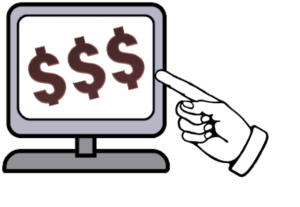Pay-Per-Click Advertising

Pay-Per-Click Advertising or PPC advertising is online marketing model in which advertisers pay a fee each time an ad is clicked on. This form of advertising allows advertisers to display their products or services to users who are searching for related items online. Also referred to as keyword advertising, PPC uses specific keywords that advertisers have bid on to determine whose ad is featured when said keywords are searched.There are several forms of PPC but the most common is search engine advertising. A few other types being display advertising, social media advertising, and affiliate marketing. The cost-per-click for each keyword will be different depending on the popularity of that word or phrase but when done correctly, the costs for your PPC campaign can be inconsequential. This can be relatively difficult as it requires a lot of research to select the right keywords for your business. There are many tools that can be used to assist in this research, one being Google Adwords.
What is Google Adwords?
Google Adwords is the single most popular system for keyword advertising. Ads are not chosen based on who bids the highest for a keyword, rather they are chosen based on the quality and relevance of their campaigns. Google Adwords also uses a campaigns’ Ad Rank to make this assessment. An Ad Rank is made up of a CPC Bid and a Quality Score. The CPC Bid is the highest amount an advertiser is willing to spend on a specific keyword and the Quality Score is a metric that values a sites click-through rate, relevance, and landing page quality. While Google Adwords can make this task considerably less difficult, it cannot do all the work. An effective keyword campaign requires an extensive amount of research in order to be successful. An effective PPC keyword campaign must be relevant, exhaustive, and expansive. All too often keyword campaigns miss out on many opportunities because they only focus on the frequently searched and popular keywords. Long-tail keywords are a massive asset to advertisers, but are often overlooked. These keywords are typically the outliers of a search, meaning they are more specific but less competitive, therefore they are generally less expensive. Utilizing these less common keywords can increase your sites reach. PPC campaigns also require constant expansion and enhancements to remain effective.
Keeping Your Campaign Relevant
Continually adding relevant PPC keywords to your campaign can help you remain pertinent. Adding negative keywords can also help your campaign. Negative keywords are a type of keyword that blocks your ad from being prompted when certain keywords or phrases are searched. Adding these negative keywords can reduce wasted spending on clicks and improve relevancy. Another campaign strategy is to split Ad Groups into smaller groups. By doing this, the smaller groups are more closely related and targeted to specific keywords. Eliminating costly keywords can also benefit your campaign. Reviewing and regulating your keywords can prevent you from wasting money on underperforming keywords or phrases. Developing a strong and effective keyword campaign can require a tremendous amount of work but the potential it creates is remarkable. The right keywords can go a long way.
For more specific Pay-Per-Click Advertising information, visit SEMrush or WordStreams’ Adwords Performance Grader.
-Kate Hull
